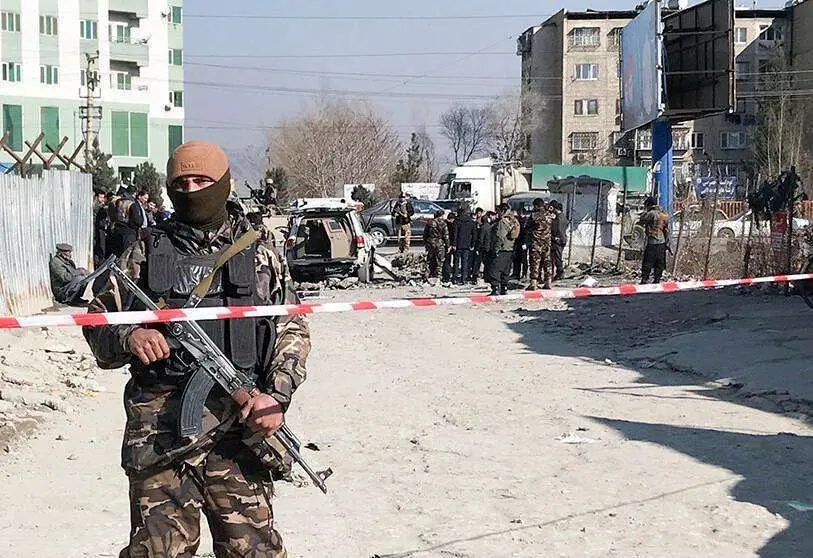Attack on Russian embassy in Kabul kills two Russian diplomatic staff members

At least two Russian diplomatic staff were killed in a bomb attack on Monday at the Russian Embassy in Kabul, located on Darul Aman Avenue. Among the dead were reportedly a security guard and the consul, the Kremlin's top representative in Afghanistan since the ambassador's withdrawal in August 2021, when the Taliban took power again after the abrupt US withdrawal, according to sources quoted by the Independent Persian.
The attack has claimed 20 lives, although the death toll could rise in the coming hours, as more than a dozen people have been injured and rushed to emergency hospital. According to eyewitnesses, the attacker is said to have detonated the explosive device in the vicinity of the compound, but other versions claim that he blew himself up inside, as several Afghan citizens were queuing to receive Russian visas.
"On 5 September, at 10:50 a.m. (...) in the vicinity of the entrance to the consular section of the Russian Embassy in Kabul, an unknown militant detonated an explosive device. As a result of the attack, two employees of the diplomatic mission were killed and there are also victims among Afghan citizens," the Russian Foreign Ministry said in a terse statement.
#Kabul: A short video of today's explosion in front of the Russian embassy, Russian citizens, diplomats, and many other people were killed and injured in this explosion. #Afghanistan pic.twitter.com/Fju2IU9Gjr
— Saeedullah Safi (@SaeedullahSafi7) September 5, 2022
Kremlin spokesman Dmitry Peskov described the attack as a "terrorist act", while Russian diplomatic chief Sergey Lavrov condemned the attack and said the Taliban had "taken measures to strengthen the protection of the outer perimeter". "Let us hope that the organisers of this terrorist attack and its perpetrators will be punished as soon as possible", the veteran Foreign Minister concluded.
"Today, in the seventh district of Kabul, security forces killed a person carrying explosives," tweeted Taliban spokesman Zabiullah Mujahid. "During the incident an explosion took place and many of our compatriots were martyred and injured," Mujahid added, saying the area was under the control of the authorities, who had already launched a "thorough" investigation.
The police chief, Malavi Saber, told EFE news agency that the attacker blew himself up in the street after being discovered by the authorities "before he reached his target, killing two civilians and injuring eleven others". According to the Taliban version, Taliban guards shot the terrorist "before he reached the crowd outside the Russian Embassy". However, the fundamentalist group has been seen threatening local journalists to prevent them from speaking to the foreign press.
⚡️5 сентября в непосредственной близости от входа в консульский отдел @RusEmbassyKabul неизвестный боевик привел в действие взрывное устройство.
— МИД России ?? (@MID_RF) September 5, 2022
❗️В результате атаки погибли два сотрудника дипмиссии, среди афганских граждан тоже есть пострадавшие.
? https://t.co/PMsKlXR6Dn pic.twitter.com/c4wph7Ftg3
"Today's suicide bombing outside the Russian Embassy in Kabul sends two messages. First, that the Taliban cannot even secure the capital on their own, let alone the rest of the country. Second, that any foreign country dreaming of having its own isolated paradise in Afghanistan should think twice," writes Faran Jeffery, the deputy director of the Islamic Theology for Counter Terrorism (ITCT), on Twitter.
Kabul police spokesman Khalid Zadran's version of events has cracks in it. If the attacker was killed, how was he able to detonate the explosive? If the attack did not take place inside the building, why is one of the dead a prominent member of the diplomatic legation? The Taliban want to avoid projecting any sign of weakness at all costs; the reality is that the group has serious problems in ensuring a minimum of security. Attacks have been the norm since the Taliban regained power two decades later.
No organisation has so far claimed responsibility, although all eyes are on the Islamic State of Greater Khorasan (ISIS-K), the Daesh affiliate in the region, active in Pakistan and Afghanistan. The jihadist group has become the main enemy of the Taliban, whom they consider traitors for their "collaborationism" with Washington, with whom they sat at the Doha negotiating table. All this despite having internal connections with the group through the Haqqani network.
#BREAKING More than 15 people killed in the suicide attack near Russian embassy in Kabul: Sputnik pic.twitter.com/SItDB4OfkZ
— Guy Elster (@guyelster) September 5, 2022
Darul Aman Avenue is located in the seventh of Kabul's 22 districts, far from the Green Zone, which houses the former US Embassy and the presidential palace. The location is a regular scene of attacks, a fact that has not deterred Moscow from keeping its legation deployed in this enclave, even after the turbulent departure of US troops. Russia is also one of the last countries with diplomatic representation in the Asian nation, although its mission is the first to be the first to be the target of an attack.
The meeting of the Kremlin's special envoy for Afghanistan, Zamir Kabulov, with senior Taliban commanders weeks before the Taliban takeover seems to have been of no use. According to the Russian Foreign Ministry, it was agreed at that meeting that the fundamentalists would protect the security of foreign embassies. This has not been the case.
Despite the threats, Moscow has not recognised the legitimacy of the Taliban government. No state has done so to date, not even China, Pakistan or Turkmenistan, with whom the Taliban have bilateral relations. Moreover, the Kremlin labels the fundamentalist militia a terrorist organisation and bans it in Russia. Nevertheless, the Kremlin has facilitated the entry of Taliban delegations into the country, most recently at the St. Petersburg Economic Forum.









